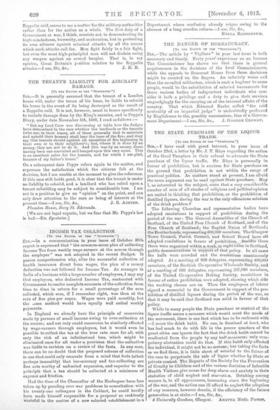INCOME TAX COLLECTION.
pro TUN EDITOR Or TRU " SPECTATOR."]
Sirt,—In a communication in your issue. of October 30th regret is expressed that " the common-sense plan of collecting Income Tax from weekly wage earners at the source through the employer" was not adopted in the recent Budget. It passes comprehension why, after the successful collection of health insurance direct from wages, the plan of a money deduction was not followed for Income Tax. As manager in India of a business with a large number of employees, I may say that employers, who deducted Income Tax, contracted with Government to render complete accounts of the collection from time to time in return for a small percentage of the sum collected, which sum, if I remember right, was then at the rate of five pies per rupee. Wages were paid monthly, but the same method would have equally well suited weekly payments.
In England we already have the principle of recoveries made by persons of small income owing to over-collection at the source; and not only could recoveries be similarly effected by wage-earners through employers, but it would even be possible to collect the tax at the true rate once for all, with only the risk of an infinitesimal loss, which might be eliminated once for all under a provision that- the collection was liable to revision on a review of the filets. In any case, there can be no doubt that the proposed scheme of collection is one that could only emanate from a mind that feels (albeit perhaps insensibly) that bureaucracy and tax-collecting are fine arts worthy of unlimited expansion, and superior to the principle that a tax should be collected at a minimum of expense and friction.
Had the time of the Chancellor of the Exchequer been less taken up by puzzling over war problems in consultation with his twenty-ono colleagues in the Cabinet, he could hardly have made himself responsible for a proposal so recklessly wasteful in the matter of a new salaried 'establishment in a
Zeppelinieild, seems to me a matter for the military authorities Department where confusion already reigns owing to the rather than for the nation as a whole. The first duty of a absence of a long overdue reform.—I am, Sir, &e.,
















































 Previous page
Previous page